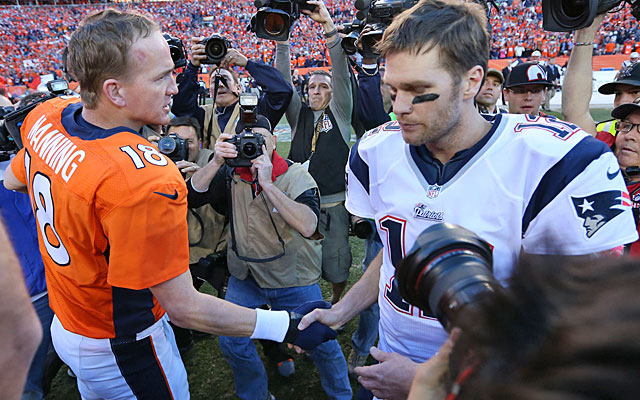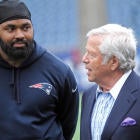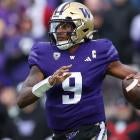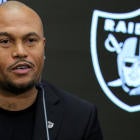
More La Canfora: New GM, same old problems for Dolphins
Stop me if you've heard this narrative making the rounds, as misguided as it might be -- now that Russell Wilson, on a cut-rate, third-round rookie contract, won the Super Bowl with the Seahawks, it's time for teams to rethink how much they pay the quarterbacks.
I can't be the only one who has seen this sentiment on websites or floated on Twitter or debated on talk radio. You know, since Seattle won with a cheap quarterback, maybe the thing to do is to let your Joe Flaccos and Matt Ryans and Tony Romos simply walk as free agents once their asking price is mandated too high, and just reallocate those assets into other positions. Oh yeah, and there is a corollary to this ridiculous theory, as well, that claims that quarterbacks are simply being paid too much and so many of them are "overpaid" and that the high cap numbers for passers are going to tear teams apart and curtail their "windows" to win a Lombardi.
This is actually going around. And it's complete, unmitigated BS. Want to know the real problem with the NFL, when it comes to salaries? How about the fact the salary cap hasn't really moved at all since 2009? How about the fact the cap doesn't seem to keep pace with the growth of the league, and that teams are handcuffed by the cap, if anything? That in and of itself doesn't speak to the actual worth of quarterbacks. The real problem is, quarterbacks are eating up a big portion of the cap not because they aren't worth it -- there is a reason teams are desperate not to let these passers hit the market -- but it's that the actual ceiling of the cap isn't growing, even with all these new television packages and all the money flowing in.
First, let me clue you in on a dirty little secret: Pretty much no one in the NFL is overpaid.
OK, sure, a guy like Albert Haynesworth might make a mockery of the process every now and again (lest we forget the role Mike Shanahan played in those shenanigans), but by and large football players end up being a bargain for owners. This collective bargaining agreement is grossly in management's favor. Player costs are more finite and fixed than they have been in the salary-cap era. There is nary an NFL starting QB who is overpaid, in relation to the overall import of the position he plays, the unique impact he has on every game, the physical risks it takes to play the position, the miniscule amount of people on the planet who can execute said job and the ridiculous gross revenues NFL owners rake in.
Newsflash: Relative to other sports, and their collective revenues, starting quarterbacks are an absolute steal, even the most expensive of the bunch. Remember, none of these deals are fully guaranteed for the life of the contracts -- unlike, say, basketball and baseball. All of these guys are potentially one hit away from the end of their career and quite possibly severe mind and body issues in their post-career lives. Their annual salaries are often dwarfed by guys in other professions who risk far less and frankly accomplish far less in relation to the overall success or failure of their franchises.
Only in the past few years have quarterbacks hit the $20M-per-season threshold. So, let's go back to 2000 -- damn near 15 years ago -- when Alex Rodriguez signed a 10-year, $252 million deal with the Texans Rangers, fully guaranteed, to take him above the $25M-per-year stratosphere. Baseball owners would sell their souls to get close to the television revenue and ratings and overall economic dominance that the NFL enjoys, but they have been willing to dole out this kind of money for a long time, to players far less impactful than a Tom Brady or Peyton Manning or Drew Brees or Aaron Rodgers.
Dodgers ace Clayton Kershaw signed a record $30M-a-season deal this winter. Would anyone argue that someone who touches the ball, at best, every fifth day has the same impact as a premier quarterback who in some cases will have his hands on the ball for literally every offensive snap his team runs in any given season? What about that fact that a scourge, Rodriguez, still makes $27 million a season even though his team, the Yankees, would do anything it could to keep him away? Ryan Howard and Josh Hamilton are just two more players who earn more per season than any NFL quarterback ever has. Every year a handful of baseball players get more than any football player ever has, even some who are limited to a part-time role like designated hitter.
Come on people, quarterbacks are underpaid, relative to any standard you could devise.
How about Kobe Bryant, pretty much at the end of his career, making $30 million-plus this season? Anyone want to make the case that Dirk Nowitzki ($23 million) is worth more than any quarterback in the history of the NFL? No one in America would try to argue the NBA makes anything close to the fiscal dent in this country that the NFL does, yet there are no shortage of NBA players getting fully guaranteed deals NFL player can never achieve. Hell, the average NBA salary is $5 million, a figure many playoff quarterbacks (Andy Dalton, Colin Kaepernick, Andrew Luck, Wilson, Nick Foles) won't come close to reaching this season.
And don't get me started on Hollywood, where we have idiot "reality" stars making the kind of money many young NFL starting quarterbacks earn. It's not uncommon at all to have mediocre actors, in successful but hardly intellectually challenging sitcoms, making $1 million per episode. But, man, god forbid Flacco or Jay Cutler or Matthew Stafford make that much per NFL start, and people start going bonkers and ripping them to shreds.
I'm sorry people, this is how the system works. Trust me, rich guys don't get this rich by throwing away their money when they don't have to. Every dollar has to be earned, carefully negotiated, and teams still hold most of the cards when it comes to this stuff. So when a quarterback gets close to $20 million a season, it's no fluke. And if you think about what Flacco did for the Ravens in the 2012 playoffs, playing pretty much flawless football to lead them to a Super Bowl title that seemed improbable a few shorts weeks before, in relation to what he's making for his owner and organization, it's a drop in the bucket.
When you start talking about franchise worth, revenue streams, marketing opportunities, sweetheart stadium deals and the diverse ways they can make money, what they have to turn over to their quarterbacks is nothing. Consider that NFL revenues, in a sport that is wrapped up in basically four months, are approaching $10 billion, while baseball is at $8 billion and basketball is at less than $5 billion. Yet those sports have their highest-paid players making, in many cases, considerably more than the top quarterbacks? The average salary of the NBA is over $5 million a year, the MLB average is $2.5 million but it's just $1.75 million in the NFL, barely above the NHL ($1.3 million).
Please. Aaron Rodgers is "worth," at the very least, every bit of the $30 million guys are making in other sports, if not more. In comparison to what he can do for his franchise, it's a no brainer. And this idea that it's easy to win with a kid quarterback making peanuts now, well, let me remind you that Manning, Brady, Rodgers and Philip Rivers still made up a good portion of the playoff field. And it won't be long before Wilson, Kaepernick, Luck and Cam Newton are making the big bucks too. But this CBA handcuffs their ability to even try to rectify that inequality until after their third season.
No, the problem isn't that quarterback salaries are going up too quickly. Not close. It has still been a slow, steady climb, especially without highly drafted rookies being able to get anything close to the $50 million guaranteed that was more or less a given under the old CBA. It's not that they are overpaid. It's that we are in something of a golden era of quarterback play. More teams are willing to run systems that cater to the skill sets of more athletic and mobile college passers. This leads to early playoff success and Super Bowl appearances. At the same time, a salary cap that was $128 million in 2009 now projects to be just $126.3 million.
That's the issue, folks.
If the cap was growing, say, 5-7 percent per year since 2009, it would be much easier to absorb the higher cap hits that naturally come with more quality quarterbacks nearing the end of their contracts. Let's say that $128 million grew by 5 percent annually (roughly $6.5 million per season), well, trust me, in that case no one would be crying about an $18 million cap hit for a quarterback. Shoot, let's dial it back and say the cap grew by $3M each year, and each team has $15M more in cap room than reality -- again, no one would be slandering QB cap hits.
Instead, the NFL and NFLPA have had to find ways to contrive ways to get the cap to even stay this flat, through deferring performance payments to future years and stripping the Redskins and Cowboys of cap space over two years and redistributing it to the rest of the league. And even that hasn't provided a true boost. Things will start to tick forward in 2015 when more of the new TV revenue kicks in, but even then I'm told the increases will be modest and incremental.
Rather than point a finger at your local QB or begrudge him what he makes or pretend that they all have supermodel wives and should pull a Tom Brady and leave a bunch of money on the table, look at your local owner, with his big-money quarterback, and point any blame there. Why not have a system in which there was more foresight for a stagnant cap, with a different accounting of cap costs for quarterbacks, some sort of exemption or whatever, given how unique the position is? It's the owner's problem, at the end of the day, in trying to align all of the resources and balance the cap, and shouldn't be the players' concern.
Next time you see a quarterback do something most of us couldn't fathom ever trying, think about that middle relief guy with the bloated guaranteed salary. Or that hackneyed actor getting fat off a cheesy role in prime time. Or that guy at the end of an NBA bench making more than Wilson, Kaepernick and Foles combined. Remember that it's the job of management and ownership to budget the cap and keep a winning team together, and if it's fine for an owner to maximize his revenue streams, don't expect a star quarterback not to do the same thing.





















